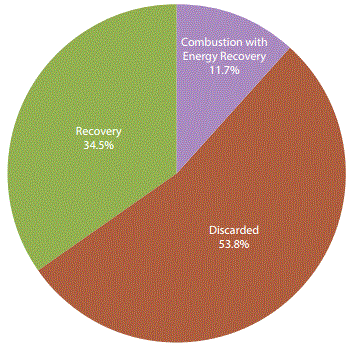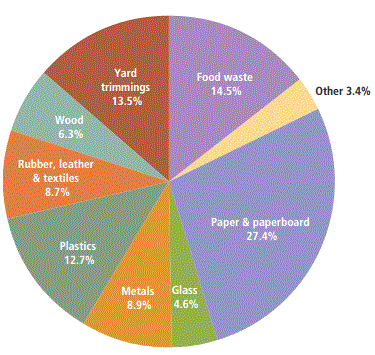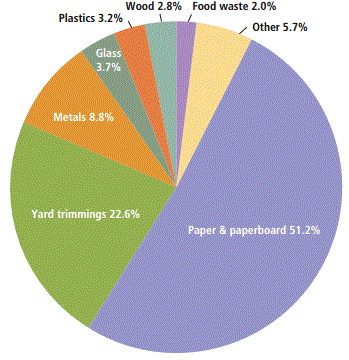Future OF Houston's
Waste Management
On average, every individual American generated 4.38 pounds of waste per day in 2012 [1]. In Houston, Texas, the average is 6.2 pounds of MSW produced per person each day [2]. Out of the 251 million tons of MSW generated in 2012, only 87 million tons were recycled or composted, that is a recycling rate of only 34.5% [3]. According to the Texas Commission on Environmental Quality (TCEQ), the Houston-Galveston area has 26 active landfills as stated in its Municipal Solid Waste 2014 Data Summary [4]. It carries the largest percentage of landfill space in all of Texas equaling 13% and having an average size of 241 acres. Its remaining capacity is set at 325.6 million tons, but with a rapidly growing population in both Houston and Galveston landfill capacity will not be able to meet projected demands.
The Waste Problem

Management of Municipal Solid Waste in the United States in 2012
Organic Waste
Organic waste in landfills typically consists of paper and cardboard as well as food waste. Because organic waste is biodegradable, it often is not considered a long term environmental issue. However, organic waste is responsible for the vast majority of methane emissions from our landfills. Due to aggressive campaigning on the part of environmental groups, paper and cardboard recycling has become fairly common in the U.S., food waste, on the other hand, has largely been ignored.

Resources
Product Waste
According to EPA numbers from 2012, a large percentage of material that went to landfills were plastics, metals and paper [1]. A total of 164 million tons of waste went to landfills and out of that number 68 million tons were due to plastic, paper and metals. Even after recycling efforts, these recyclable materials are still being put into landfills in large quantities. Efficiency, participation rates, as well as economic issues hinder recycling programs in the US. The same goes for Houston and is why our focus centered on reducing the amount of these materials going to landfills as well as solving the the three issues of recycling as previously listed.
Please refer to our Policy Document for far greater detail and a full list of sources.
[1] http://www3.epa.gov/epawaste/nonhaz/municipal/pubs/2012_msw_fs.pdf
[2] http://www.houstonbeautiful.org/recycle.html
[3] http://www3.epa.gov/epawaste/nonhaz/municipal/pubs/2012_msw_fs.pdf
[4] http://www.tceq.state.tx.us/assets/public/comm_exec/pubs/as/187-15.pdf
Total MSW Generation (by material), 2012

Total MSW Recovery (by material), 2012

Total MSW discarded into landfills in the US after recycling and composting) in 2012